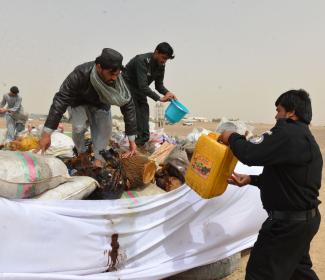Afghanistan
International responsibility

Attempts to correct this mistake and remove drug patrons from office were made too late and only half-heartedly. A professional and covert smuggling network was already deeply entrenched, systematically protected by persons at the highest levels of government. This network is well connected to all centres of political and economic power in Afghanistan.
Since 2002, the USA alone has invested over $ 7.5 billion to fight drugs in Afghanistan. Germany spends an annual € 5 million on promoting the cultivation of legal agricultural products as an alternative to poppies. The impact of such measures, however, is not evaluated thoroughly. Experience shows that, though farmers grasp such opportunities, the impact is not strong enough to disrupt the illegal drug business, which has come to dominate Afghanistan’s political economy.
Since 2001, the drug industry has thus been inextricably linked to the state-building process. Key players understood how to use drugs to shore up their power. A holistic approach will be needed to uproot them. Development programmes must tackle underlying issues such as poverty first and foremost. To date, the focus has been on repressing the cultivation, processing and trade of drugs in the context of counterinsurgency measures. The approach was destined to fail. It will take decades to effectively repress a drug economy that grew resilient in 30 years of war. (jk)







